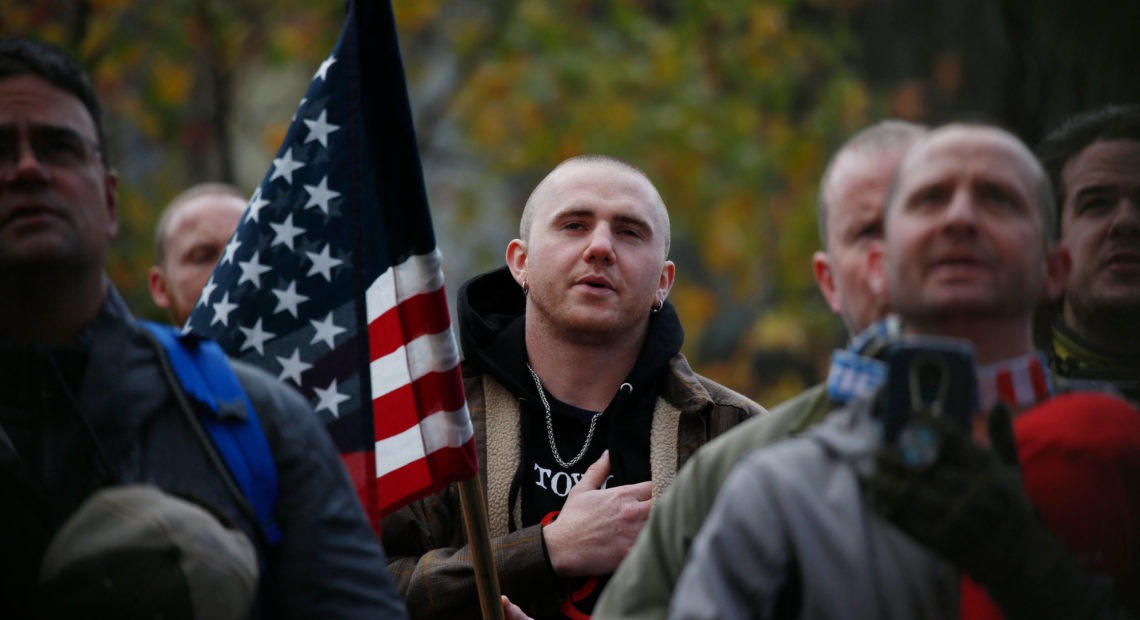
A Washington Militia Defends Its Image. Leader Says They’re ‘Not A Paramilitary,’ Embraces Matt Shea
LISTEN
BY HANNAH ALLAM & JIM URQUHART
On a recent morning, Matt Marshall sat at a back table in Jim Bob’s Chuck Wagon, a café in an old timber town about a half-hour outside of Seattle.
It was the eve of a political rally that Marshall had spent months planning. He scribbled last-minute notes in a homemade booklet, a Christmas present from his daughter. On the front, in black marker, she had drawn the logo of the Washington Three Percent, the name of her dad’s militia.
Although, that’s not the word he uses.
“We’re absolutely not a paramilitary,” he said. “We’re a nonprofit corporation.”
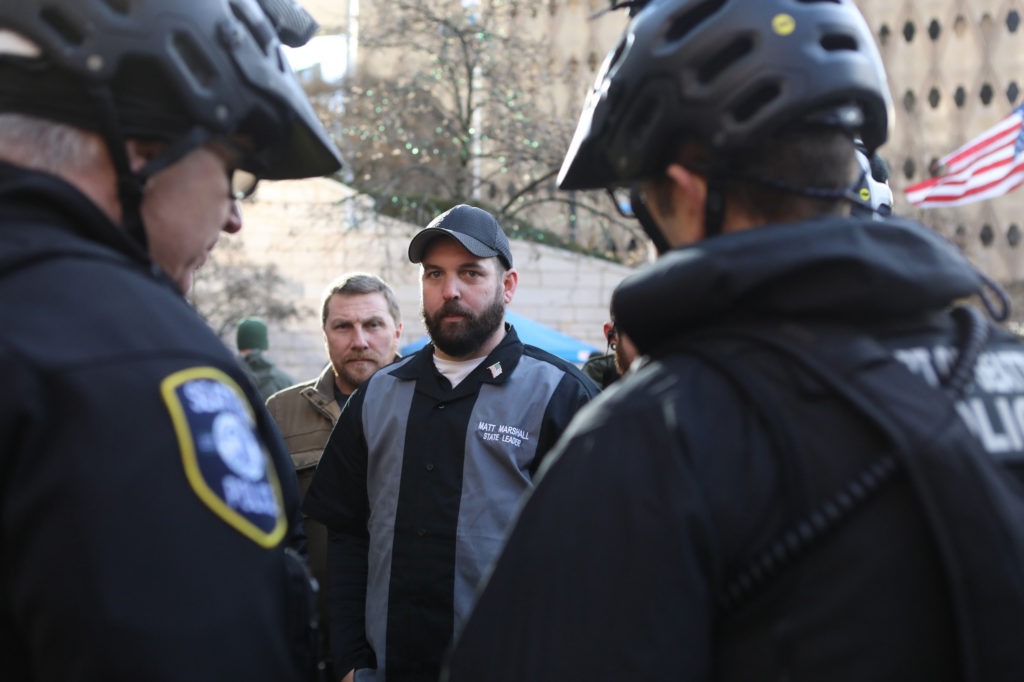
Matt Marshall, state leader of the Washington Three Percent, talks with law enforcement during the rally. He is trying to distance his group from the militia image. CREDIT: Jim Urquhart for NPR
To Marshall, “militia” conjures images of wannabes in the woods with guns – all bluster, no action. He said that is why he has grown frustrated with the national leadership of the Three Percent, which is named for the (debunked) belief that only 3% of colonists fought in the American Revolution.
It’s part of the broader “Patriot Movement,” an assortment of militias, survivalists and self-described “constitutionalist conservatives” that question the legitimacy of the federal government and seek to limit its powers. Typically, these factions get lumped together under one catchall: anti-government extremists.
“The narrative is, we’re an all-white man, Christian Dominion-type, crazy, out-there, far-right militia,” Marshall said.
So, he set about changing that image.
First, Marshall broke with the national Three Percent and took his group independent. He registered the Washington Three Percent as a nonprofit corporation — a move soon copied by groups in other states. Marshall’s next step was even bolder: He ran for a spot on the Eatonville school board, pledging to represent conservative values. Headlines portrayed him as a danger.
Then, Marshall won. The victory was bigger than a school board seat — it was a ticket to the mainstream. But before he could get too far from the fringe, a domestic terrorism scandal yanked him back.
A report commissioned by Washington state lawmakers found that Republican Rep. Matt Shea was linked to three armed standoffs with the government and had advocated “biblical warfare,” even suggesting death was appropriate for those who disobey biblical law. Shea’s own party painted him as a domestic terrorist; he became a pariah at the Statehouse. Still, Shea refuses to resign and brags that labeling him an extremist has only boosted his popularity.
Shea doesn’t have many friends left at the Capitol, but he does have a friend in Matt Marshall, as well as the support of several other militias and Patriot factions across the region. Marshall said he has spoken extensively with Shea and is convinced that the claims against him are sensationalized.
“It is very much a leaked thing that was used in a political way to make him look bad when he was giving a Bible study,” Marshall said. “While you read Scripture, it can sound very, very violent. It doesn’t mean he’s saying, ‘We need to go do these things.’ ”
Marshall knows he’s gambling with his political future by standing up for Shea — and he thinks it’s a safe bet. Voters have known Shea’s reputation for years, and they continue to elect him. Marshall said state lawmakers are missing the resentment bubbling up in rural, conservative areas that feel steamrolled by big-city liberals in Olympia and Seattle.
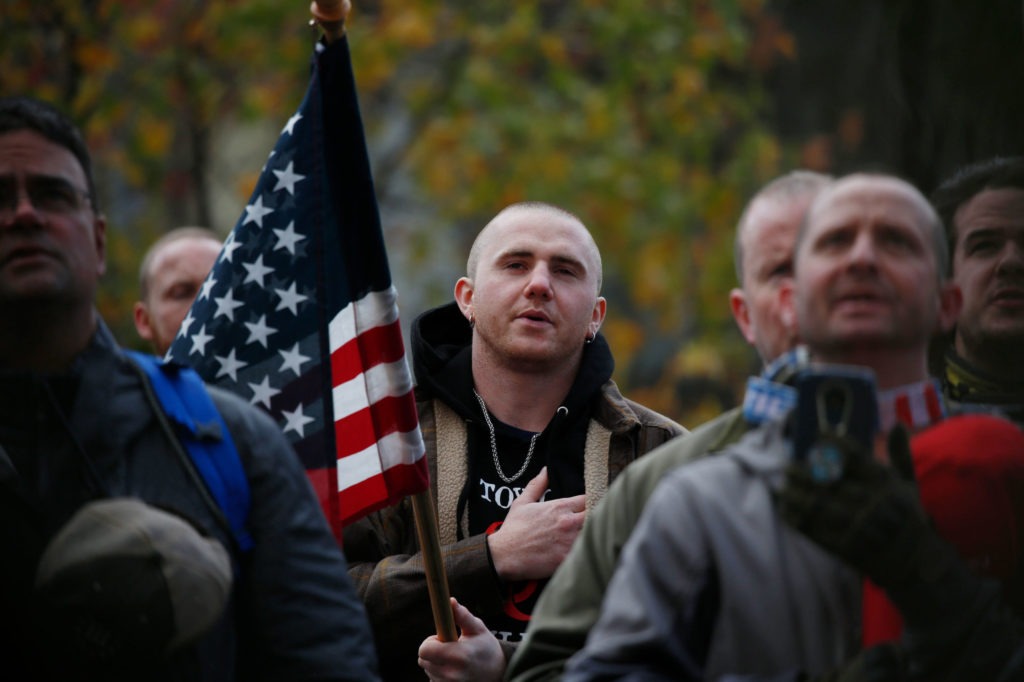
Attendees recite the Pledge of Allegiance during the United Against Hate rally by the Washington Three Percent in Seattle last month. CREDIT: Jim Urquhart for NPR
“They can try to marginalize us as extremists all they want,” he said. “But we’re much more mainstream than they realize.”
That’s why Marshall has decided the time is right for his next big move. He just announced a run for the state Legislature.
The militia and the leftists
Perhaps the unlikeliest twist in Marshall’s rebranding of the Washington Three Percent is the long, under-the-radar communication he had with armed leftists.
For more than a year, Marshall was in talks with the Puget Sound John Brown Gun Club, named after the abolitionist who led the 1859 raid on Harpers Ferry. The relationship ended in disputed circumstances. The gun club warns that its experience with the Three Percent is a cautionary tale as Marshall wades deeper into state politics.
This account comes from Marshall as well as interviews with five members of the John Brown group. Only one of them agreed to be fully identified: Shannon McMinimee, a 41-year-old civil rights attorney who serves as the group’s lawyer.
“There was an open line of communication, historically,” McMinimee said. “But that kind of went down in a ball of flames courtesy of some of the choices they made.”
The talks began as a security measure to reassure each other – two armed groups on opposite sides of the political spectrum – that there would be no friction if they were in the same area. But, both camps said, the dialogue eventually deepened and they broached ideology.
They found common ground on the Second Amendment but fought over some of the company Marshall kept. Namely, far-right figures known for espousing white nationalism and hatred of Muslims and Jews.
“The conversation was, ‘Do you really want to be affiliated with that?’ ” McMinimee said. “Because you say you aren’t racist, but when you stand next to a racist, that makes it really hard for us to believe you.”
There were other concerns, too. The leftists sometimes joke that their “blogging hands” get tired from chronicling all the dog-whistle racism and anti-Semitism that crops up on the Washington Three Percent’s social media accounts. And then there was Marshall’s appearance on Infowars, the conspiracy-peddling outlet McMinimee called “pure tinfoil hat.”
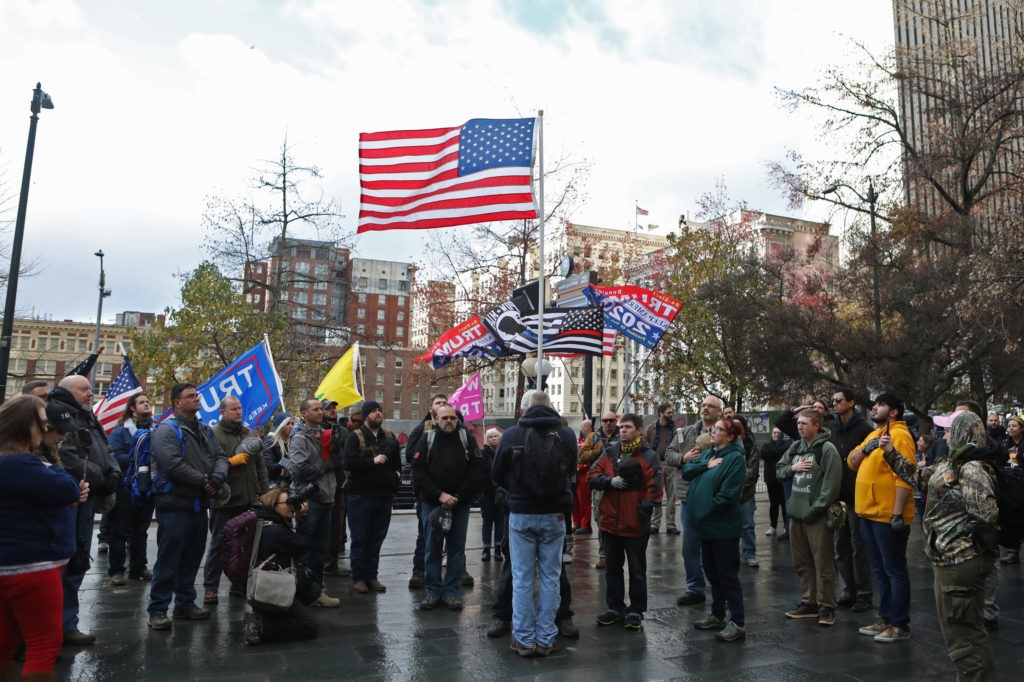
When members of the Washington Three Percent rallied in Seattle in January 2020, leftists with whom they have communicated with in the past showed up to protest. CREDIT: Jim Urquhart for NPR
Marshall said much of the criticism is unfair. There are around 330 vetted members of the Washington Three Percent — they’ve passed a screening process. But he said it’s a losing battle trying to police the comments of a few thousand unknown followers on their public pages. And Marshall admitted that he has “dropped into” some chats where he commented without first realizing racists were in the same forum. But he doesn’t expect his detractors to believe that it wasn’t intentional.
“We’re stuck in the middle. The true neo-Nazis hate us, which they should because we hate them too,” Marshall said. “And the far left, who we don’t have any problems with, hate us because they believe that we’re neo-Nazis.”
McMinimee said the John Brown Gun Club eventually decided it “was done trying to make this work.” Among the reasons: Marshall’s support for Matt Shea, the state lawmaker and accused extremist.
“Doubling down on your support for someone whose own party wants to expel him from the state Legislature?” McMinimee said. “There have to be some lines.”
Marshall’s version is different. He said the break came in the aftermath of an attack last July on an Immigration and Customs Enforcement (ICE) detention center in Tacoma. Willem Van Spronsen, a far-left activist who previously belonged to the John Brown club, allegedly attacked the center with “incendiary devices” and was shot dead by police. “I am Antifa,” Van Spronsen reportedly wrote in a manifesto, referring to the militant anti-fascist movement.
Marshall said some Three Percenters made crude jokes about Van Spronsen – an affront to his shocked, grieving friends in the John Brown club.
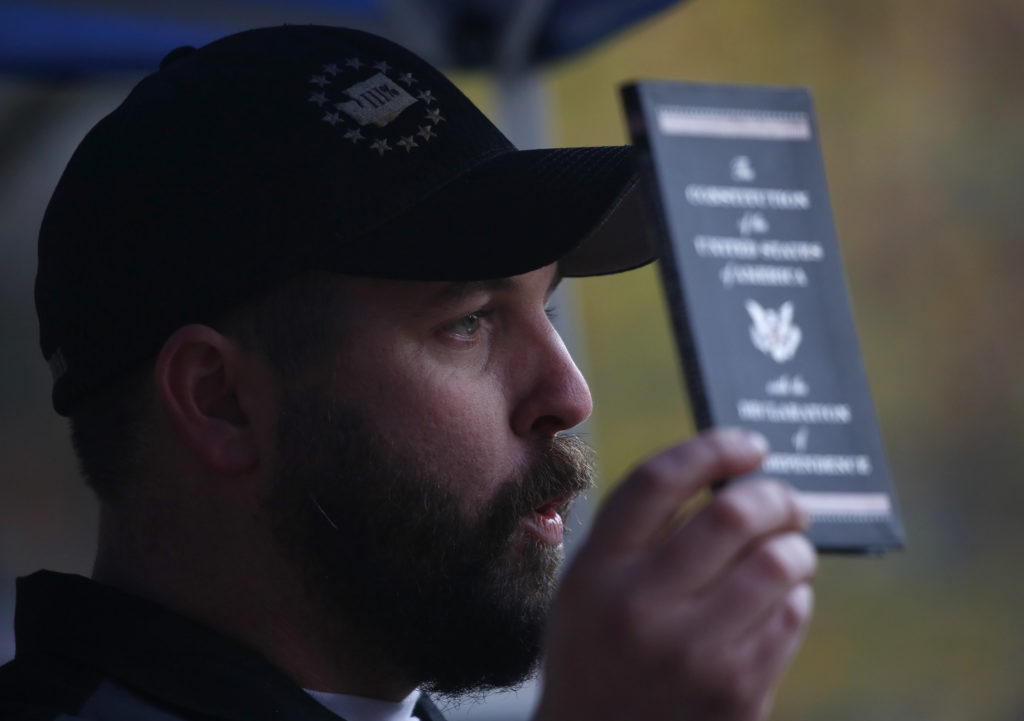
Matt Marshall, state leader of the Washington Three Percent, holds a copy of the U.S. Constitution during the United Against Hate rally. CREDIT: Jim Urquhart for NPR
“That pretty quickly burned the bridge,” Marshall said.
Marshall recently released bodycam footage that documents a key moment in that relationship. The footage shows a contingent of John Brown members — including Van Spronsen — crossing police lines to talk face to face with Marshall at a rally last year.
“It was a respectful debate, a conversation,” Marshall said. He said he had hoped that channel would grow, maybe help bridge the polarization that he sees as a threat to the country’s stability.
Now, however, all that has fizzled. Marshall said he had invited leftists to join him again, at his latest rally in downtown Seattle. There were no takers.
On the day of the event, the Puget Sound John Brown Gun Club showed up. Only this year, the members didn’t cross the cordon in a goodwill gesture.
Instead, they carried long guns and stood guard over the protesters who tried to drown out Marshall’s speech with their chants: “Hey hey, ho ho, the Three Percent has got to go.”
Copyright 2020 NPR. To see more, visit npr.org















